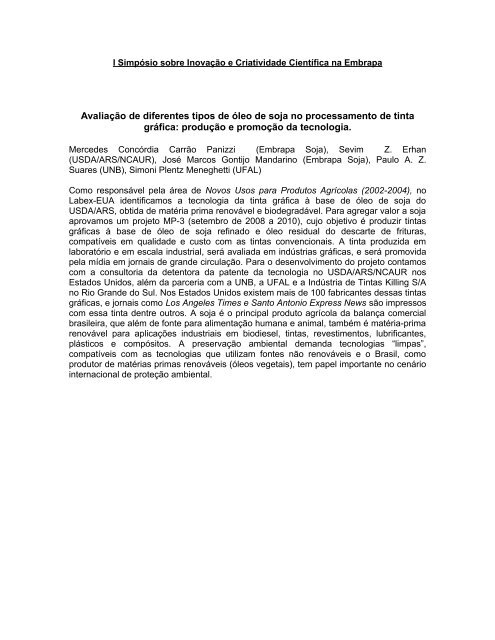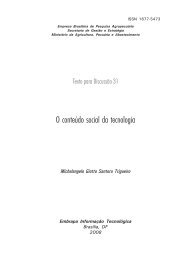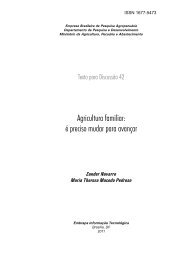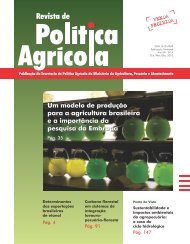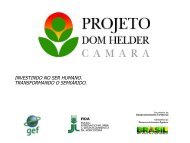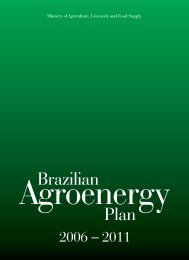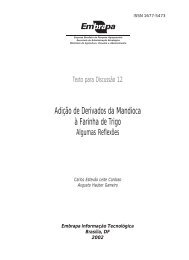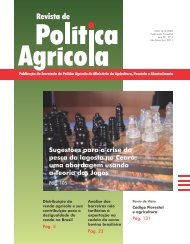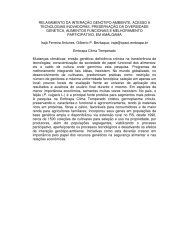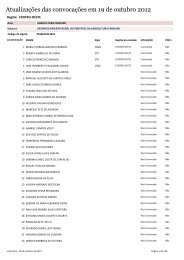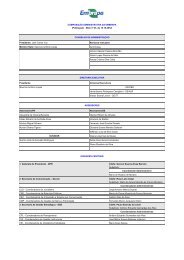Mercedes Concórdia Carrão Panizzi - Embrapa
Mercedes Concórdia Carrão Panizzi - Embrapa
Mercedes Concórdia Carrão Panizzi - Embrapa
You also want an ePaper? Increase the reach of your titles
YUMPU automatically turns print PDFs into web optimized ePapers that Google loves.
I Simpósio sobre Inovação e Criatividade Científica na <strong>Embrapa</strong><br />
Avaliação de diferentes tipos de óleo de soja no processamento de tinta<br />
gráfica: produção e promoção da tecnologia.<br />
<strong>Mercedes</strong> <strong>Concórdia</strong> <strong>Carrão</strong> <strong>Panizzi</strong> (<strong>Embrapa</strong> Soja), Sevim Z. Erhan<br />
(USDA/ARS/NCAUR), José Marcos Gontijo Mandarino (<strong>Embrapa</strong> Soja), Paulo A. Z.<br />
Suares (UNB), Simoni Plentz Meneghetti (UFAL)<br />
Como responsável pela área de Novos Usos para Produtos Agrícolas (2002-2004), no<br />
Labex-EUA identificamos a tecnologia da tinta gráfica à base de óleo de soja do<br />
USDA/ARS, obtida de matéria prima renovável e biodegradável. Para agregar valor a soja<br />
aprovamos um projeto MP-3 (setembro de 2008 a 2010), cujo objetivo é produzir tintas<br />
gráficas à base de óleo de soja refinado e óleo residual do descarte de frituras,<br />
compatíveis em qualidade e custo com as tintas convencionais. A tinta produzida em<br />
laboratório e em escala industrial, será avaliada em indústrias gráficas, e será promovida<br />
pela mídia em jornais de grande circulação. Para o desenvolvimento do projeto contamos<br />
com a consultoria da detentora da patente da tecnologia no USDA/ARS/NCAUR nos<br />
Estados Unidos, além da parceria com a UNB, a UFAL e a Indústria de Tintas Killing S/A<br />
no Rio Grande do Sul. Nos Estados Unidos existem mais de 100 fabricantes dessas tintas<br />
gráficas, e jornais como Los Angeles Times e Santo Antonio Express News são impressos<br />
com essa tinta dentre outros. A soja é o principal produto agrícola da balança comercial<br />
brasileira, que além de fonte para alimentação humana e animal, também é matéria-prima<br />
renovável para aplicações industriais em biodiesel, tintas, revestimentos, lubrificantes,<br />
plásticos e compósitos. A preservação ambiental demanda tecnologias “limpas”,<br />
compatíveis com as tecnologias que utilizam fontes não renováveis e o Brasil, como<br />
produtor de matérias primas renováveis (óleos vegetais), tem papel importante no cenário<br />
internacional de proteção ambiental.
Evaluation of differents types of soybean oil in soyink processing:<br />
production and promotion of the technology.<br />
<strong>Mercedes</strong> <strong>Concórdia</strong> <strong>Carrão</strong> <strong>Panizzi</strong> (<strong>Embrapa</strong> Soja), Sevim Z. Erhan<br />
(USDA/ARS/NCAUR), José Marcos Gontijo Mandarino (<strong>Embrapa</strong> Soja), Paulo A. Z.<br />
Suares (UNB), Simoni Plentz Meneghetti (UFAL)<br />
As responsible for the area of New Uses for Agricultural Products (2002-2004), at the<br />
Labex-USA Laboratory we identified the soyink technology from USDA/ARS, which is<br />
biodegradable and obtained from renewable raw material. To add value to soybean it was<br />
approved a project MP-3 (September 2008 to 2010), with the objective of producing inks<br />
from refined soybean oil and residual oil discarded from fries, which should be compatible<br />
in quality and costs with the conventional inks. The inks produced in laboratory and in<br />
industrial scale, will be evaluated in press industries, and will be promoted by media in<br />
journals of big circulation. For development of the project we will have consultance of the<br />
technology patent detentor from USDA/ARS/NCAUR, in the United States, as well as<br />
pathernship with UNB, UFAL and Indústria de Tintas Killing S/A from Rio Grande do Sul.<br />
In the United States there are more than 100 soyink factories, and journals such as Los<br />
Angeles Times and Santo Antonio Express News, among others are pressed with this ink.<br />
Soybean is the main agricultural product of the commercial Brazilian balance, which<br />
besides source of human and animal feeding, is also raw renweable material for several<br />
industrial applications such as biodiesel, inks, paints, adehesives, lubricants, plastics, and<br />
composites. The environmental preservation demands “clean” technologies, compatible<br />
with technologies that utilize non renewable sources and Brazil, as a main producer of<br />
renewable raw material (vegetable oils), has an important role at the international scenario<br />
of environmental protection.


